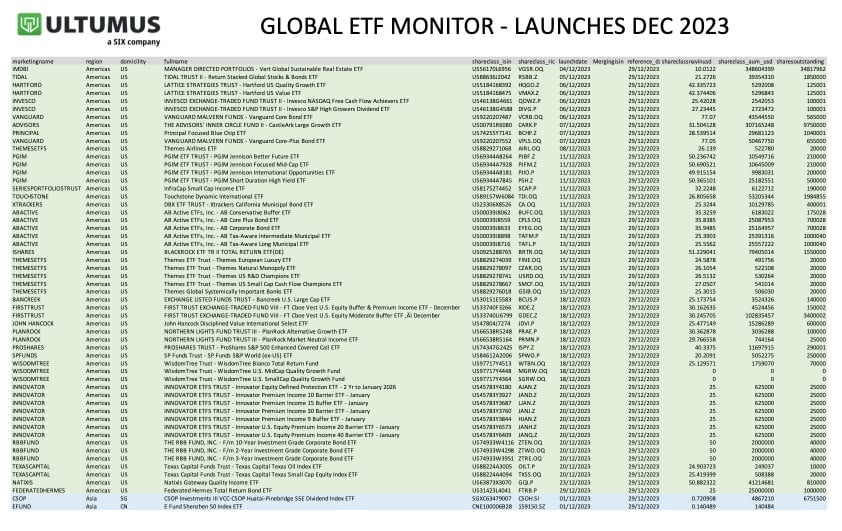USA
Innovator lists an ETF of ETFs for beating ETFs
Illinois-based Innovator ETFs is listing a new ETFs that tracks an index of ETFs that is designed to beat the equity and fixed income markets most ETFs track, the Innovator IBD ETF Leaders ETF (LDRS).
LDRS will invest in an index of ETFs put together by consultancy IBD. LDRS immediately excludes commodity ETFs, leveraged and inverse ETFs, and ETNs. It then further excludes ETFs with average daily trading volume under 100,000 the past 50 days; ETFs that have performed below their 6-month average; and ETFs that have underperformed the S&P 500 the past 3 months.
After these exclusions are made, LDRS scores ETFs based on relative strength factors. Those that achieve a certain score are put in the index and equally weighted.
Analysis
Using ETFs to build an ETF that then tries to beat the market is certainly a novel idea. But will it work? The famous line in every finance disclaimer says that past performance is not a guide to the future. And one wonders if something similar is also true of LDRS. To qualify in LDRS’ index, ETFs have to have beaten the S&P500 the past 3 months. But beating the S&P 500, which has returned 18% this year, is hard and almost every smart beta ETF listed this year has failed to do it. But supposing one does choose ETFs based on three months of outperformance, is that any guarantee they’ll continue doing so? Obviously not. Regardless, this ETF will be one to watch.
Another biblically responsible ETF for 2017
White labeller Exchange Traded Concepts is listing a biblically responsible ETF with help from James Investment Research, the James Biblically Responsible Investment ETF (JBRI).
Like other biblically responsible ETFs listed this year (in what seems to be one of 2017’s most least likely ESG trends), JBRI will exclude companies that are involved in activities that it “deems objectionable from a biblical perspective.” These include the usually suspect activities like support for abortion, gay rights and lifestyle, porn, alcohol, tobacco and gambling. But does not include activities like arms dealing or making money from despotic foreign governments, as with other biblically responsible ETFs like BIBL.
Having made its exclusions JBRI then evaluates US large caps for more conventional performance indicators, like profitability, value and momentum. Companies that rank in the top 100 get put in the index on an equal weighted basis.
Korea
Koomkin Bank lists Korean sector ETFs
Koomkin Bank’s ETF arm KBStar is listing a suite of ETFs that track Korea’s different sectors via indexes provided by Kospi. They are:
- KB KBSTAR 200 Steels & Materials ETF (285020)
- KB KBSTAR 200 Heavy Industries ETF (285010)
- KB KBSTAR 200 Financials ETF (284980)
- KB KBSTAR 200 Information Technology ETF (285000)
- KB KBSTAR 200 Energy & Chemicals ETF (284990)
KBStar is not the first Korean issuer to do this. Mirae Asset, which co-owns Horizon ETFs in North America and BetaShares in Australia, has already listed ETFs tracking the same indexes.
Taiwan
Capital Securities lists three bond ETFs
Taipei-based Capital Securities is listing three new corporate bond ETFs that track BofA Merrill Lynch Indexes. They are:
- Capital Industrials Corporate Bond ETF (00722B)
- Capital Industrials Corporate Bond ETF (00723B)
- Capital Industrials Corporate Bond ETF (00724B)
I cannot tell the difference between the three funds. There must be some difference because they have different registration numbers. As is often the case in East Asian listings at this early stage there is no English language material available.
UK
Source lists junk bond ETF in euros
Source is listing its PIMCO-managed junk bond ETF in euros, the PIMCO Short-Term High Yield Corporate Bond Index Source UCITS ETF (STEA).
STEA tracks the BofA ML 0-5 Year US High Yield Constrained Index, which puts together high yield US bonds that are mostly rated B or below. Factsheet here.



